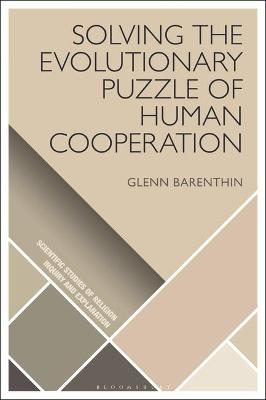
Solving the Evolutionary Puzzle of Human Cooperation
Seiten
2019
Bloomsbury Academic (Verlag)
978-1-350-10675-8 (ISBN)
Bloomsbury Academic (Verlag)
978-1-350-10675-8 (ISBN)
In this book, Glenn Barenthin provides a new solution to a key question in the cognitive and evolutionary study of religion: why do humans cooperate?
What led humans, uniquely among animals, to have large-scale civilizations with unprecedented cooperation? One explanation, propagated by the Big God Proponents (BGP), argues that a moralizing God is the crucial motivator for the pro-social behaviour necessary for large scale civilization. To explore this idea, Barenthin provides a critical assessment of the evidence provided by the BGP, and also discusses the place of God in our moral thinking.
However, using evidence from anthropology, history, cognitive science, psychology and game theory, Barenthin presents a new theory: that the evolutionary pressures faced by our forebears paved the way for emerging humans to engage in what he terms ‘thin cooperation’. This type of cooperation requires individuals to comprehend the reasons for their actions, and it is often done with others in mind. Finally, Barenthin argues that humans also have the capacity for ‘thick cooperation’, which is made possible by those fighting for the rights of strangers in an attempt to make the world a fairer place for a greater number of people.
What led humans, uniquely among animals, to have large-scale civilizations with unprecedented cooperation? One explanation, propagated by the Big God Proponents (BGP), argues that a moralizing God is the crucial motivator for the pro-social behaviour necessary for large scale civilization. To explore this idea, Barenthin provides a critical assessment of the evidence provided by the BGP, and also discusses the place of God in our moral thinking.
However, using evidence from anthropology, history, cognitive science, psychology and game theory, Barenthin presents a new theory: that the evolutionary pressures faced by our forebears paved the way for emerging humans to engage in what he terms ‘thin cooperation’. This type of cooperation requires individuals to comprehend the reasons for their actions, and it is often done with others in mind. Finally, Barenthin argues that humans also have the capacity for ‘thick cooperation’, which is made possible by those fighting for the rights of strangers in an attempt to make the world a fairer place for a greater number of people.
Glenn Barenthin is Professor at the University of Guelph-Humber, Canada. He has taught courses on criminal law, forensic techniques, criminal investigations and the idea of human rights.
List of Figures
Foreword
Acknowledgements
List of Abbreviations
Introduction
1. Minds, Gods and Group Selection Theory
2. A Modest Proposal
3. Family Matters
4. From ‘Thin’ to ‘Thick Cooperation’
5. How Does That Make Sense?
6. The Road to “Denmark”
References
Index
| Erscheinungsdatum | 31.07.2019 |
|---|---|
| Reihe/Serie | Scientific Studies of Religion: Inquiry and Explanation |
| Zusatzinfo | 2 bw illus |
| Verlagsort | London |
| Sprache | englisch |
| Maße | 156 x 234 mm |
| Gewicht | 531 g |
| Themenwelt | Geschichte ► Teilgebiete der Geschichte ► Religionsgeschichte |
| Geisteswissenschaften ► Religion / Theologie | |
| Naturwissenschaften ► Biologie ► Evolution | |
| Sozialwissenschaften ► Ethnologie | |
| Sozialwissenschaften ► Soziologie | |
| ISBN-10 | 1-350-10675-5 / 1350106755 |
| ISBN-13 | 978-1-350-10675-8 / 9781350106758 |
| Zustand | Neuware |
| Informationen gemäß Produktsicherheitsverordnung (GPSR) | |
| Haben Sie eine Frage zum Produkt? |
Mehr entdecken
aus dem Bereich
aus dem Bereich
Von den Anfängen bis zur Gegenwart
Buch | Hardcover (2022)
C.H.Beck (Verlag)
34,00 €
Herkunft, Blüte, Weg nach Osten
Buch | Hardcover (2024)
C.H.Beck (Verlag)
39,00 €


